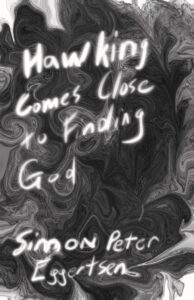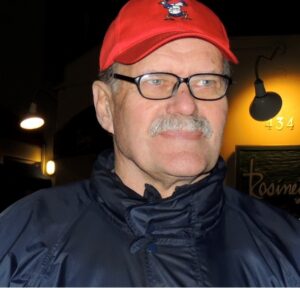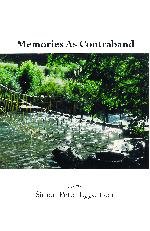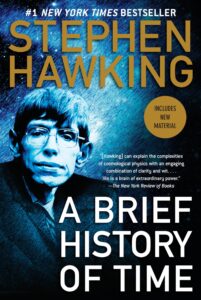 Simon Peter Eggersten introduces his new poetry collection, Hawking Comes Close to Finding God.
Simon Peter Eggersten introduces his new poetry collection, Hawking Comes Close to Finding God.
As one commentator has noted, “Eggertsen has challenged himself by basing the core poems in this book on the ideas of Stephen Hawking.” And, as Turret House Press says in its release, “Through the lens of theoretical physics and inspired by the ideas and writings of Stephen Hawking, Eggertsen spins a vivid examination of time and history, both cosmic and deeply personal. A bold collection full of secrets and mystery.” You will pardon the hyperbole, surely it is unintentional!
In any instance, it is a fact that this debut collection is built around a set of poems that focus on the ideas of Stephen Hawking, the well-known British theoretical physicist. In Mormon parlance, he was interested in the Creation, the Beginning of Time. These pieces are intended as an homage to him even as they bracket the other poems in the book.
Hawking, as many readers may know, was exceptional, his thinking ambitious, even galactic, his curiosity about the origins of our Universe deep. He died in 2018 without having finished his work on the Theory of Everything, the deepest existential explanation in physics of how our Universe came into being. Something that will be relatively beyond even Einstein’s fundamental equation E = mc².
About his work, Hawking was always clear. He thought science could do a better job of explaining our origin story than attributing it all to the mythic hand of God, as essential as that account is to many of us. He was serious and strict about this view. This presents a challenge of sorts to a Utah-raised, Mormon-bound chap like me. The tension between science and theology can be real. But rather than counter his views directly, rather than contend, I prefer to have some fun with it, especially in the poem that offers the title. It is a curious one in which I imagine Hawking working to finish the equation that would unify everything about the physics of the beginning of the Universe. (This is heady stuff all, not the usual fodder for poetry.) It is here that I speculate, tongue in cheek, that his search leads him to come around, get close to finding God! I like to think I have him trapped in the paradox of inadvertence, with a touch of irony. Take a look:
At last, nearly finished, he thinks about what to do
with the tricky magnetism that pulls stark singularities
together, next to those places in the Universe where
God, exhausted, might have hidden after having used
the same processes Hawking has now been thinking about,
resting that seventh day after having been the first
to speak the word “Light.”
Hawking is getting closer to Everything.
There is a lot said there. This outcome likely would have startled Hawking. The point is that he did not believe in a personal God, declared himself an atheist who worshipped at the altar of science. In the end, quippingly, I have Hawking in another poem asking God to let him live on as color and spice! And, in the last poem, I even ask Hawking to write equations that will solve for four things from my own personal experience that have puzzled me. Hawking, I suspect, would have enjoyed the tease, the irony of what I set out in his name. He had a very quick sense of humor, liked his own sharp teases. For my part, I am not trying to be dogmatic here, I am trying to point out alternatives, using kidding as a form of deference and respect in the face of his impressive ideas. And, I am working from personal experience.
Some analysts have speculated that if Hawking had a place for God in his theories, it was for the God of the philosopher Spinoza—One who behaves in accordance with the Natural Laws of the Universe, rather than One who established those same rules to manage creation. It becomes a matter of hierarchy. I like this view. It permits me to believe two, perhaps exclusionary, things at the same time—that God created the Universe and it was done while working within a set of principles the likes of which Hawking was trying to enunciate. (I am ignoring for the moment, of course, the competing ideas of ambiguity and certainty and the sheer power of belief!! I think this is what some actually call ‘the suspension of disbelief.)
There is a reason for this focus on Hawking. I got to know him, personally, when I was at Cambridge many years ago, well before I thought of poetry. And, though not a scientist, I have followed, even been fascinated by, his ideas and writings ever since, even if some of it was, like space, far beyond me. Things were made much easier to understand when he issued his very accessible classic A Brief History of Time (1988). I have let the Hawking poems frame this book. They will speak for themselves. But there is more.
In the spirit of all this, many of the poems found here, though they take up other subjects, are imbued with some of the rich language and the vivid imagery of theoretical physics. In short, though, not everything here centers on Hawking, science or God. As a group, the poems go much further. They are really about more. If there is something of the wonder for the intricacies of the Universe in the Hawking poems, there is also something of the wonder for, and a bit of the terror of, our own world, and, specifically, my own experience, in the other pieces. In this way they are connected and show my fascination with language and the subjects.
For example, you will get a sense, among other things, of how persistent shadows, that intriguing form of light, can be in the streets of Hanoi a night before the Vietnamese holiday, Tềt. How dune elephants are created by the sea breeze and the sand near Zinjibar in Yemen in another. One poem has Georgia O’Keeffe painting the mountain and mesa fringes of New Mexico better than God, herself! Here, women on Zanzibar swallow up the light reflected from a sun-bleached mosque in their black buis buis then, with the feel of magical realism, become sails on spice-ladened dhows heading to the souks of Oman, looking to trade for bundles of golden ear rings, pieces of Omani amber.
Another hints at where the feluccas on the Nile sometimes intend to sail as the sun-disk sets behind the Pyramids. One takes up the imagery of arc welding as it explores the crushing of the students in Tiananmen Square (I was in Beijing that weekend for other reasons). And, there is something about what we learned as children from using hammers at Wildwood in Provo Canyon, and what we did not. There is also an inventive verse that explores how the quark-like particles of familiar connection and experience (geneology and place) in combination, might have spark-formed the intriguing individual identities of my younger children. And, in the end, one asks how children in Trinidad learn, without knowing why, learn to call the sword plant “mother-in-law’s tongue!” And, there is more.
Simon Peter Eggertsen
Montreal, December 2024
 SIMON PETER EGGERTSEN was born in Kansas, raised in Utah, schooled in Virginia and England. He has degrees in literature, language, and law (BYU, Virginia, Cambridge). He came very late to creative writing. His work has appeared in Nimrod, Spoon River Poetry Review, Ekphrasis, Atlanta Review, Vallum, Weber: The Contemporary West, and Dialogue, among
SIMON PETER EGGERTSEN was born in Kansas, raised in Utah, schooled in Virginia and England. He has degrees in literature, language, and law (BYU, Virginia, Cambridge). He came very late to creative writing. His work has appeared in Nimrod, Spoon River Poetry Review, Ekphrasis, Atlanta Review, Vallum, Weber: The Contemporary West, and Dialogue, among others. A set of his verse won the Irreantum Prize for Poetry (2012). His work has been published in a chapbook Memories as Contraband (Finishing Line, 2014), and now this collection, Hawking Comes Close to Finding God (Turret House Press, 2024).
others. A set of his verse won the Irreantum Prize for Poetry (2012). His work has been published in a chapbook Memories as Contraband (Finishing Line, 2014), and now this collection, Hawking Comes Close to Finding God (Turret House Press, 2024).

